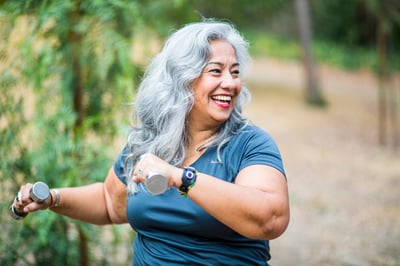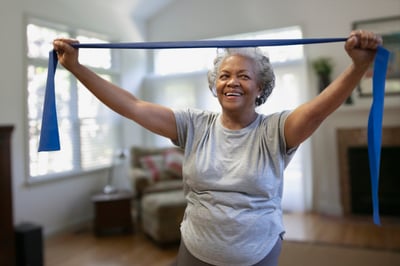 Osteoporosis is a common condition that affects millions of women, especially after menopause. With weakened bones that can fracture easily, even a minor fall can lead to serious injury. The good news is that osteoporosis can be managed effectively with proper screening, lifestyle changes, and the help of your Moreland OB-GYN provider.
Osteoporosis is a common condition that affects millions of women, especially after menopause. With weakened bones that can fracture easily, even a minor fall can lead to serious injury. The good news is that osteoporosis can be managed effectively with proper screening, lifestyle changes, and the help of your Moreland OB-GYN provider.
In this blog, we cover osteoporosis symptoms, treatment options, and prevention for women concerned about bone health.
- What is osteoporosis
- Signs and symptoms of osteoporosis
- Osteoporosis tests and treatments
- Exercises and exercises to avoid
- And more
What Is Osteoporosis?
The word osteoporosis means “porous bone,” a suitable description for a disease that causes the bone to deteriorate. It is often called the “silent disease” because it typically does not cause any signs or symptoms until a bone fracture occurs.
Osteoporosis Explained
Your bone tissue constantly reabsorbs old cells and produces new cells to maintain strength and density. New bone cell production typically outpaces old cell reabsorption into young adulthood, when most people achieve peak bone mass.
After this point, bone loss outpaces bone growth. In some individuals, this bone loss occurs to a greater extent, causing the bones to become weak and brittle. This condition is known as osteoporosis.
Osteoporosis is more common in women than men. It’s estimated that 50% of women and 20% of men over the age of 50 are at risk of an osteoporosis-related fracture. The most common osteoporotic fractures are hip, spine, and wrist fractures.
These kinds of fractures can lead to:
- Severe back pain
- Humped back
- Disabilities
- Death
Menopause can impact more than bone health. Learn more here.
What Causes Osteoporosis?
More than 25 million Americans have osteoporosis. But why?
While bone loss is a natural process that can’t be prevented entirely, several risk factors for osteoporosis explain why some people are more likely to have it than others.
These include:
- Sex — While both men and women can develop osteoporosis, women are at higher risk.
- Age — Risk for bone loss increases with age.
- Low Sex Hormones — Reduced estrogen levels in aging women contribute to bone density loss.
- Race — Osteoporosis is most common in Caucasian and Asian patients.
- Family History — Osteoporosis does have a genetic component.
- Body Size — People with smaller body frames have less bone mass to rely on as they age. This is another reason osteoporosis is more common among women.
- High Hormone Levels — An overactive thyroid, parathyroid, or adrenal glands are associated with osteoporosis.
- Certain Medications — Long-term use of corticosteroid medications interferes with bone growth.
- Poor Nutrition — Eating disorders and malnutrition weaken bones and increase the risk of osteoporosis.
- Lack of Calcium — A lifetime of low calcium intake impairs new bone cell production.
- Gastrointestinal Surgery — Surgeries that shrink your stomach or remove part of the intestine reduce your body’s ability to absorb bone-strengthening nutrients like calcium.
- Tobacco Use – Tobacco has been shown to contribute to bone weakness.
- Excessive drinking — More than two alcoholic beverages a day can increase your risk of osteoporosis.
- A sedentary lifestyle — Exercise is excellent for bone health.
- Certain medical conditions — Some medical conditions, such as cancer, celiac disease, inflammatory bowel disease, kidney or liver disease, lupus, multiple myeloma, and rheumatoid arthritis, are associated with a higher risk of osteoporosis.
While you can’t change biological risk factors, you can follow healthy habits to promote good bone regrowth. If you have any medical conditions or use medications or treatments that may increase your risk for osteoporosis, speak with your doctor about your concerns.
Osteoporosis Prevention
While some risk factors for osteoporosis, like age and family history, can’t be changed, there are many steps you can take to help prevent the disease or slow its progression.
Adopting healthy habits early in life and continuing them through menopause is key to protecting your bones. Living a healthy and active lifestyle, eating a calcium-rich diet, keeping up with your annual health exams, and avoiding excessive alcohol and tobacco use are just a few ways to help prevent osteoporosis.
Remember, prevention is always easier than treatment. Whether you’re in your 20s or 30s or menopausal, taking proactive steps now can reduce your risk for fractures later in life.
Signs and Symptoms of Osteoporosis
For something so debilitating, osteoporosis can be stealthy. Typically, there are no symptoms in the early stages of bone loss. You could be living with osteoporosis for many years without realizing it.
Osteoporosis may be suspected due to symptoms such as:
- Loss of height over time.
- A stooped posture or humped back.
- Back pain from fractured or collapsed vertebrae.
- A bone fracture that occurs very easily.
Regular exams can help detect osteoporosis before serious damage occurs.
There are many reasons to see your gynecologist after having children. Check out this blog post to learn more!
Osteoporosis, Osteoarthritis, and Osteopenia… What’s the Difference?
What is Osteopenia?
Osteopenia is considered an intermediate point between healthy bone density and osteoporosis. Osteopenia is defined by bone density test results demonstrating low bone density, but not as low as osteoporosis.
Osteopenia can be a precursor to osteoporosis, but it is not a sure sign that bone deterioration will progress further. A well-rounded diet, adequate weight-bearing exercise, and some medications can prevent progressive bone weakness.
Moreland OB-GYN is proud to be a leading women’s healthcare provider in the greater Waukesha area, offering expert care for women of all ages. Schedule an appointment today to speak with a provider about osteoporosis testing, prevention, or treatment options.
Osteoporosis Test
While osteoporosis often doesn’t cause symptoms in the early stages, you can monitor your bone health with a bone density test. This test reveals if you have low bone density. It is an easy, painless test that takes about 15 minutes.
Low-dose X-rays are used for the bone density test. The spine and hips are typically evaluated. These two sites represent the grams of calcium and other minerals in a square centimeter of bone tissue. The higher the mineral content, the better the bone density and the less likely you are to develop bone loss in the near future.
Bone Density Test Near Me
If you are a menopausal woman age 60 or older or have other risk factors above for low bone density, talk to your Moreland OB-GYN provider about having a bone density test. Our team of caring providers will take the time to listen to your needs, discuss risk factors, and walk you through the process of bone density testing and treatment if bone loss is detected.
How to Reverse Osteoporosis

Unfortunately, there is no cure for osteoporosis, but you can slow its progression and avoid serious injuries.
If you have osteopenia, talk to your Moreland OB-GYN doctor about an appropriate health regimen to promote better bone density.
If you already have osteoporosis, you can still prevent fractures and improve bone health with the proper care plan and medications.
What to Eat and Drink if You Have Osteoporosis
Calcium is the most important nutrient for bone health. It is recommended that women over age 50 consume 1,200 mg of calcium each day. To get your daily dose and fight osteoporosis, add these calcium-rich foods to your diet:
- Milk
- Yogurt
- Sardines
- Canned salmon
- Cheese
 Beans
Beans- Lentils
- Seeds
- Collard greens
- Spinach
- Rhubarb
- Whey protein
- Almonds
- Edamame
- Tofu
- Figs
- Amaranth
- Fortified cereals
- Fortified breads
- Fortified soy milk
- Fortified orange juice
Vitamin D also plays an essential role in helping your body absorb calcium, so consider foods like fatty fish or supplements as needed.
Want to make healthier choices to support your bones and overall wellness? Check out our blog for tips on building a balanced diet that will support long-term health.
Osteoporosis Exercises

Eating well isn’t enough to prevent bone loss. Certain exercises help, too.
The best types of exercise for preventing and managing osteoporosis are weight-bearing and muscle-strengthening exercises.
Some examples of beneficial exercises for bone health include:
- Aerobics.
- Walking on a treadmill or outside.
- Using a stair-step machine.
- Dancing.
- Push-ups.
- Lifting weights.
- Using exercise bands.
When your bones are weak, you have to be careful during physical activities. Before you begin a new exercise program, consult a physician and get medical clearance. They can help you start slow and create a smart exercise plan.
Avoid Falls
Fall prevention is important for reducing the risk of osteoporosis-related fractures. The International Society for Clinical Densitometry (ISCD), shares some tips:
- Always have adequate lighting, especially at night.
- Remove rugs in high-traffic areas.
- Keep pets from getting underfoot.
- Correct eyesight.
- Use walking aids when necessary.
- Add grab bars in bathrooms.
- Wear appropriate shoes with a back so they don’t slide off.
What to Look for In an Osteoporosis Doctor
Many doctors’ training includes the diagnosis and treatment of the condition. As you consider a physician, ask about their experience with osteoporosis and if they offer bone density testing.
If you live in the greater Waukesha area and are concerned about osteoporosis, Moreland OB-GYN is here to help.
Request an appointment today to start taking charge of your bone health.










